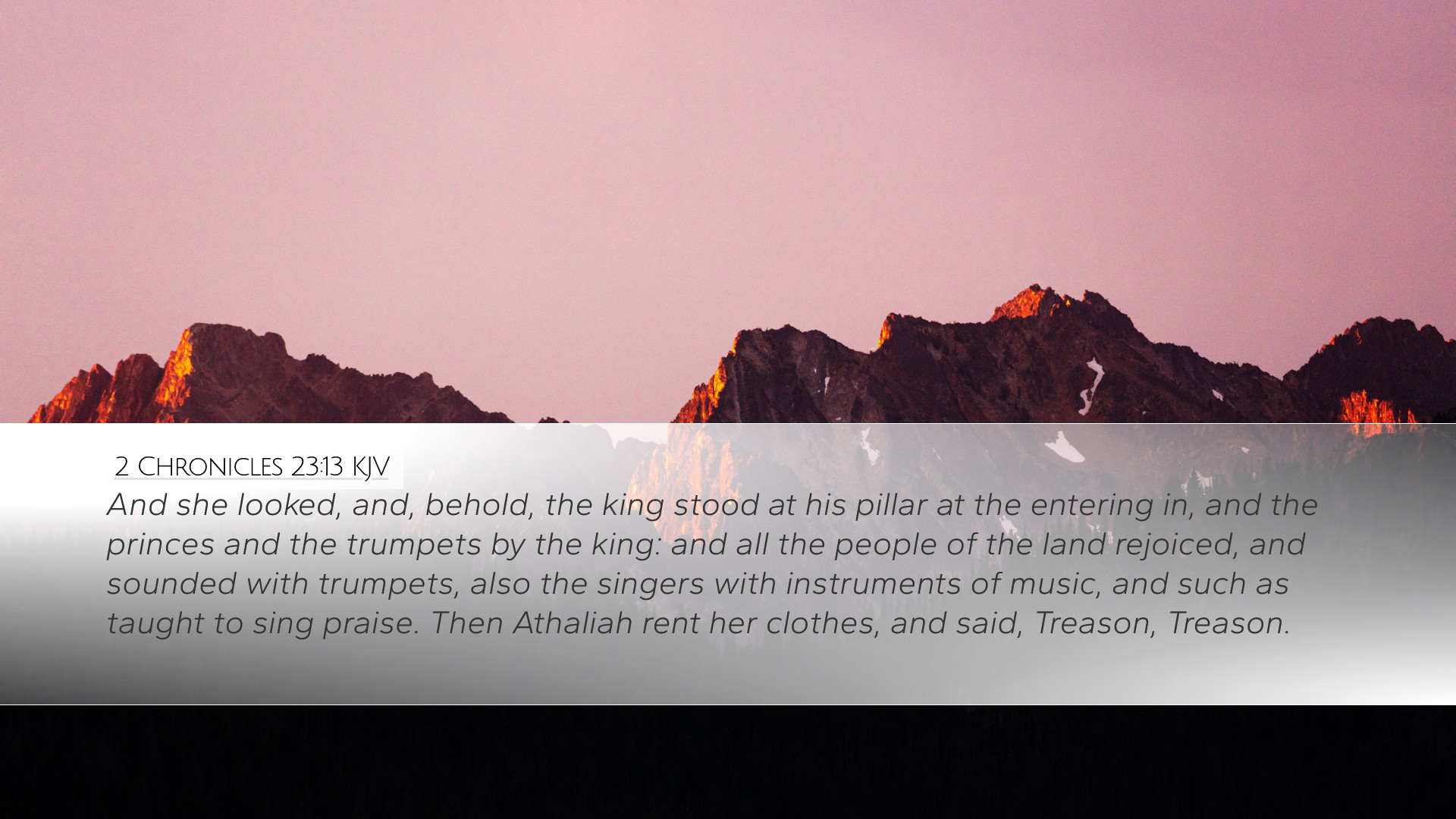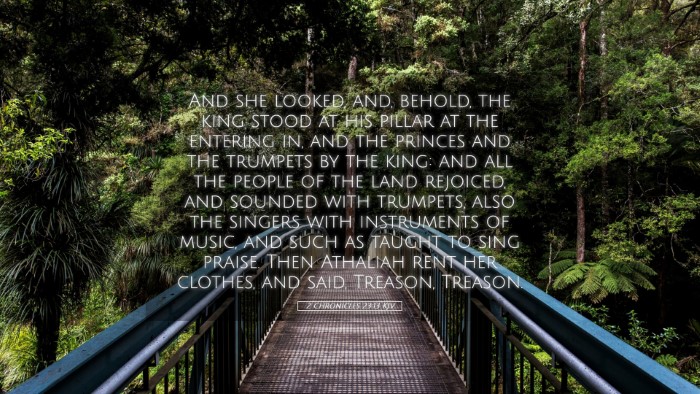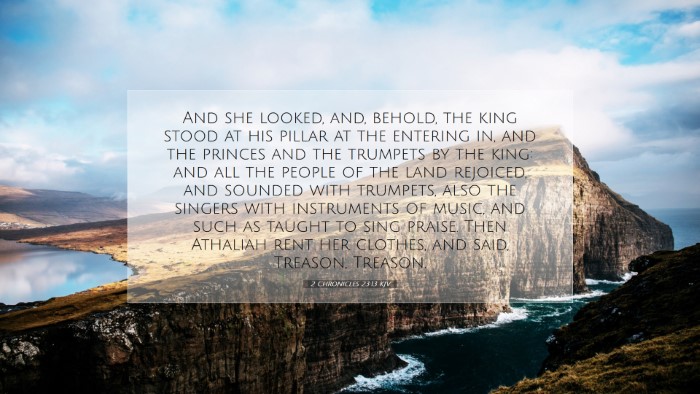Commentary on 2 Chronicles 23:13
Verse Context: 2 Chronicles 23 describes the dramatic events surrounding the overthrow of Athaliah and the establishment of Joash as king over Judah. Athaliah's reign was marked by tyranny and idolatry, and her removal is significant for the restoration of true worship. Verse 13 is a pivotal moment illustrating the public reaction to the announcement of the new king.
Verse Analysis
2 Chronicles 23:13 reads:
"And she looked, and, behold, the king stood at his pillar at the entering in, and the princes and the trumpeters by the king, and all the people of the land rejoiced, and blew with trumpets: and the singers with instruments of music, and such as taught to sing praise. Then Athaliah rent her clothes, and said, Treason! Treason!"
This verse captures a compelling scene where the people recognize Joash as their rightful king, while Athaliah's reaction underscores her desperation and the stark contrast between her oppressive rule and the joyful proclamation of God's anointed.
Insights from Matthew Henry
Matthew Henry emphasizes the expectations surrounding the anointing of Joash. He remarks on the excitement among the people, noting that the presence of skilled musicians and joyous trumpeters exemplifies the communal approval and the divine orchestration behind this significant moment. Henry points out how this public display was integral in reinforcing the legitimacy of Joash's claim to the throne and invites reflections on the importance of worship and rejoicing in the presence of God’s deliverance.
Insights from Albert Barnes
Albert Barnes draws attention to the implications of Athaliah's actions. Her tearing of clothes is a traditional sign of mourning and protest, indicating her extreme disapproval of Joash's coronation. Barnes connects this to the symbolic significance of the royal pillar at the entrance, highlighting how it serves as a marker of legitimate authority. He further discusses the role of music and celebration as essential elements of Israelite culture that reflect the people's acknowledgment of divine favor. Barnes urges readers to recognize the transformative power of divine intervention in restoring rightful order.
Insights from Adam Clarke
Adam Clarke provides a thorough historical context for the events described in this passage. He elaborates on the political and spiritual upheaval in Judah during Athaliah's reign and the intense need for faithful leadership. Clarke suggests that the public celebration upon Joash's recognition as king is indicative of a nation yearning for restoration and healing. His analysis reflects on the broader theological context, stressing that this moment symbolizes God's faithfulness in preserving His covenant people despite their previous unfaithfulness.
Theological Implications
This verse holds profound theological significance for understanding God's governance. The events depicted reveal several key themes for pastors, students, theologians, and scholars:
- The Sovereignty of God: The narrative illustrates that God’s plans prevail against human scheming and tyranny. In moments of oppression, God's purpose is leading history toward a redemptive outcome.
- Worship in Response to Deliverance: The celebration by the people highlights the appropriate response to God's acts of salvation, emphasizing that authentic worship is rooted in acknowledging God’s intervention.
- Leadership and Responsibility: The transition from Athaliah’s oppressive rule to Joash’s reign signifies a shift towards a godly leadership model, highlighting the importance of rulers reflecting God’s justice and mercy.
- Contrast Between Darkness and Light: Athaliah's despair in the face of her overthrow can be seen as emblematic of the struggle between spiritual darkness and light, a theme that permeates both the Old and New Testaments.
Practical Applications
For contemporary readers, this passage encourages reflection on several practical applications:
- Celebration of God’s Deliverance: Just as the people rejoiced when Joash was declared king, modern believers are called to celebrate and proclaim the works of God in their lives, leading worship that reflects joy and gratitude.
- Discernment in Leadership: This episode poses a challenge to communities in evaluating their leaders, urging the faithful to seek leaders who honor God and lead according to His principles.
- Responding to Spiritual Oppression: Athaliah's defeat serves as a reminder of God’s power to overcome any spiritual or societal challenges, encouraging believers to persevere in prayer and action against forms of idolatry and injustice.
Conclusion
The event in 2 Chronicles 23:13 reflects the joyous confirmation of God’s providence in securing a righteous king amidst turmoil. It is a biblical narrative that resonates through the ages, speaking to the persistent themes of God’s sovereignty, the importance of righteous leadership, and the call to joyful worship in the face of deliverance. As readers engage deeply with this text, may they find renewed hope in God’s faithfulness and an invitation to reenact such joyful proclamations in their lives today.


